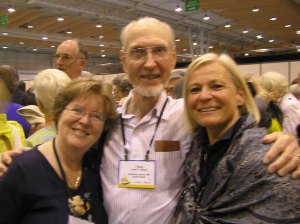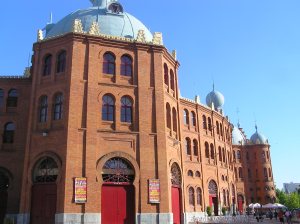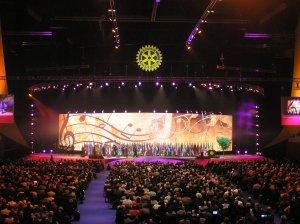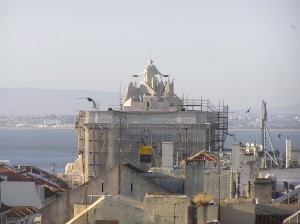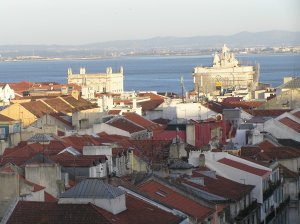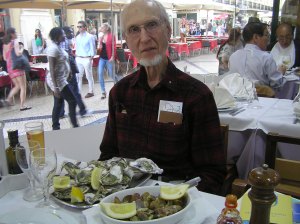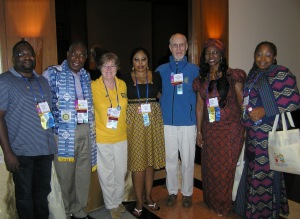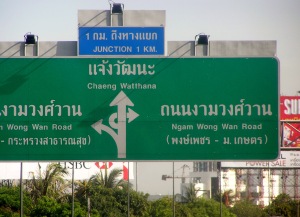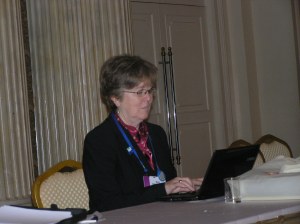
Between jet lag, the Rotary convention, and meeting people, I’m afraid this blog has gotten frightfully outdated. Let me see if I can sum up the past week in just a few paragraphs.
SPEAKERS. What is there to say when the first speaker of a four-day convention is none other than Ban Ki Moon? And when later that day the prime minister of Sri Lanka drops by?
NUMBERS. Estimates are all over the place on how many Rotarians were here this week. The problem is that the folks doing the counting were doing so at the entrance to the plenaries, and there was plenty to do without going to the plenaries. What seems clear is that this is the largest gathering of Rotarians ever – and the numbers are probably in the high 40,000s.
PEOPLE. One of the really neat things about Rotary and its annual convention is that one is likely to run into people one has seen before .. on the other side of the world. I did that and more, not only running into Rotarians from far-off distances, but also I got to talking with a Rotarian from the very-close-by Brunswick Coastal club, and it turns out that our paths crossed professionally way back in the late ’70s. (Yes, you guessed it, we shared a nursery school together).
SPECIAL INTERESTS. The various dinners, breakfasts, whathaveyou for Rotarians of specific interests are especially fun just for this reason. Frank and I always attend the All-Africa Breakfast where, for sure, whatever we are wearing pales in comparison to what the African Rotarians are wearing. And the Arch Klumpf Society dinner is always a good time, although more sedate than the All-Africa Breakfast.
 WAR VETERANS. This year the city where the Convention was held through a special lunch for veterans/families of those who served during the Korean War or in Korea since the war. Frank qualifies as the former, so we went … and were royally feted, not only with lunch, but also with singing, dancing and, of course, speeches. It was also fun to see what Koreans serve for a banquet meal when they are left to their own devices. And it was good to recognize that the sacrifices of the UN nations has not been forgotten.
WAR VETERANS. This year the city where the Convention was held through a special lunch for veterans/families of those who served during the Korean War or in Korea since the war. Frank qualifies as the former, so we went … and were royally feted, not only with lunch, but also with singing, dancing and, of course, speeches. It was also fun to see what Koreans serve for a banquet meal when they are left to their own devices. And it was good to recognize that the sacrifices of the UN nations has not been forgotten.
ENTERTAINMENT. Rotary typically tries to get top-name entertainment for the Convention – some are hits, others are misses (Because Ray Klinginsmith, from Missouri, was president when the Convention was held in New Orleans, so I am afraid we had country music rather than jazz. Ugh). This time, while most of the entertainment was versions of Korean traditional, the Convention closed with Psi, a K-pop singer who happens to have the song with the most YouTube hits of all time, and who also happens to be a third-generation Rotarian. Who knew?
ROTARY NEWS. Oh, yes, that’s what we’re here for, isn’t it? And the news is good – with polio on the run and Membership numbers not growing, but at least we’ve stopped the slide, and Rotary changing – or, I should say, the Rotary world recognizing that change is all to the good.
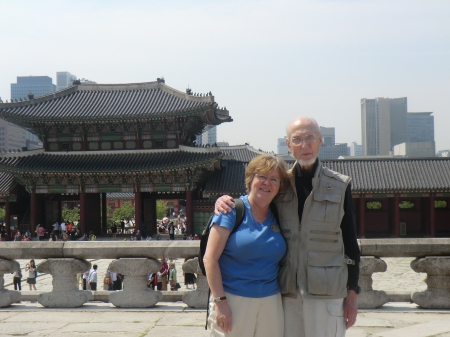
AND THEN THERE’s SEOUL. Part of the fun of a convention is discovering a new city. Let’s face it, Korea was never on my top-ten list, but we’re here, and Frank and I have discovered a warm and hospitable people, an ancient culture and strong national pride, and absolutely amazing cultural sites.
NEXT YEAR, ATLANTA. And a convention without jet lag for us! I can relate to that.



 Posted by martyhelman
Posted by martyhelman 

